| Srl | Item |
| 1 |
ID:
126247
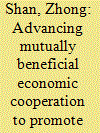

|
|
|
| 2 |
ID:
092596
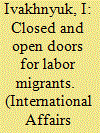

|
|
|
| 3 |
ID:
172841
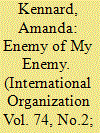

|
|
|
|
|
| Summary/Abstract |
Policies to mitigate global climate change entail significant economic costs. Yet a growing number of firms lobby in favor of regulation to mitigate carbon emissions. Why do firms support environmental regulations that directly increase production costs? This question is all the more puzzling in a globalized economy where regulation may undermine the competitiveness of domestic firms at home and abroad. By imposing differential costs on participants in the domestic market, policies designed to mitigate carbon emissions shift market share toward firms with low anticipated adjustment costs. I develop and test a model of climate change policymaking in the presence of market competition and open borders. Heterogeneity in adjustment costs induces a preference for regulation among low-cost firms. Firms facing import pressure—or export competition—may prefer stringent regulation if costs are sufficiently asymmetric. Firms embedded in global value chains also benefit if regulation raises the costs of domestically produced intermediate goods.
|
|
|
|
|
|
|
|
|
|
|
|
|
|
|
|
| 4 |
ID:
103946
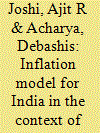

|
|
|
|
|
| Publication |
2011.
|
| Summary/Abstract |
In this article, an atheoretic model is built to explain and forecast inflation, using variables that capture domestic as well as foreign influences on inflation. In all, five specifications of models are estimated, one with only domestic variables and four with one of the foreign price variables, namely, Commodity Price Index (COMM), US Producer Price Index (USPPI), crude oil price (CRUDE), industrial countries' Consumer Price Index (CPI) (INDCPI). It is found that models with foreign price indicators provide better in-sample fit than the baseline model with only domestic variables. Among the models with foreign price variables, the Commodity Price Index (COMM) performs as the best foreign price variable among the set used, in terms of both in-sample and out-of-sample root mean squared errors (RMSE).
|
|
|
|
|
|
|
|
|
|
|
|
|
|
|
|
| 5 |
ID:
132311
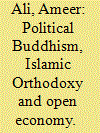

|
|
|
|
|
| Publication |
2014.
|
| Summary/Abstract |
After nearly a millennium of uninterrupted harmony between the Sinhalese and Muslims in Sri Lanka, economic and ethno-religious developments after the 1970s have created an atmosphere of communal tension between the two groups. While a new wave of political Buddhism with its militant offshoot amongst the Sinhalese and the growth of a rigid Islamic orthodoxy amongst the Muslims have provided the ethno-religious dimension to this tension, the post-1977 open economy has added an economic dimension to it. The interplay of this toxic triad is a reminder of a similar scenario that produced the first Sinhalese-Muslim racial riots in the country in 1915. Unlike the first, which occurred in the colonial context, the current one, which if not arrested, will not only jeopardize Sinhalese-Muslim harmony but also will result in adverse consequences in Sri Lanka's relations with Muslim countries.
|
|
|
|
|
|
|
|
|
|
|
|
|
|
|
|
| 6 |
ID:
093663
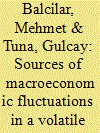

|
|
|
|
|
| Publication |
2009.
|
| Summary/Abstract |
This paper studies the sources of macroeconomic fluctuations in a typical small open economy, Turkey, using a structural vector autoregressive (SVAR) model. The study finds that supply-side shocks are the main source of output fluctuations in the long run, explaining almost half the variance of domestic output. However, most of the short-run variability in domestic output is dominated by relative demand shocks. Aggregate demand shocks do not appear to play any significant role in output fluctuations in the long run. Changes in fiscal policy play a moderate role in determining the real exchange rate in the short term, while changes in world output and prices of imported inputs are the major determinants of the long-term real exchange rate. The long-run price variations are mainly due to oil price and world output shocks.
|
|
|
|
|
|
|
|
|
|
|
|
|
|
|
|
| 7 |
ID:
111104
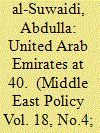

|
|
|